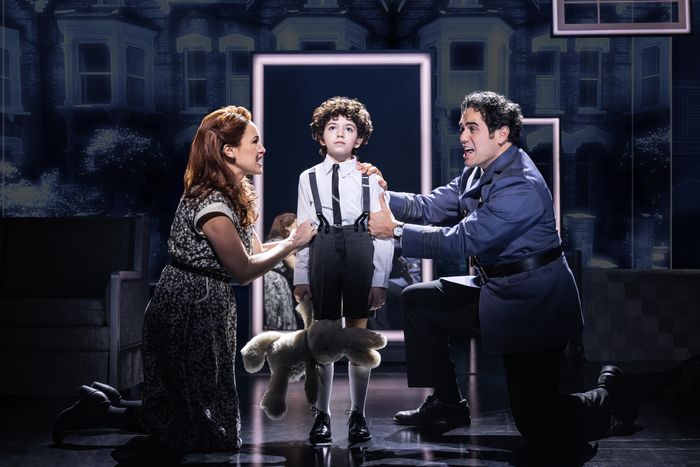
There’s something exhilarating and also a little bizarre about Tommy as both time capsule and time traveler. Pete Townshend’s music and the otherworldly hero it’s wrapped around clearly have legs for days: Who doesn’t want to headbang when that “Pinball Wizard” guitar riff starts? At the same time, and for all its zealous energy, the Who’s heady rock opera can’t help feeling like a curio, one that seems to come back around every three decades or so. The album is from 1969; Townshend and director Des McAnuff’s stage musical first hit Broadway in 1993, and this revival marks the latter’s 30th birthday, with McAnuff again behind the bullhorn. (At intermission, I met up with a fellow Vulture writer and her dad, a serious Who fan who saw the original Broadway production in ’93. “Were you alive?” he asked.) It’s not that there’s anything offensive about Tommy’s datedness — McAnuff and co. have made sure of that. Rather, it’s that the story and its form arose from and carry with them a cultural sensibility so vastly different from our own that there’s always a thin current of friction crackling between them. After all, when the album debuted, the grand age of opera was as old as this one is now — a person could conceivably have seen the premiere of Madama Butterfly and bought the Who’s double LP on its release day. Classic rock is becoming, like most classical music, a product of a remote era.
This is the risk, or simply the fact, of live theater: Watch Elton John and Tina Turner in Ken Russell’s 1975 film of Tommy, and you’re watching something fixed in time. Go to the Nederlander, and you’re watching strata of time interact via living bodies sweating in a real space, which will always give rise to the question of why this thing now? But this friction isn’t necessarily a bad thing — it can produce results across the spectrum in terms of a play’s resonance. With Tommy, if the dissonance is sometimes distancing, it’s also fascinating. Though I spent long stretches of the show intrigued and amused rather than earnestly rocking out, I was never not entertained. I had plenty of questions, but I also had a damn good time.
First, one of my questions: Did McAnuff have to get Daft Punk’s permission for this show? Is that secretly Daft Punk up there wailing when a live band is revealed during the big Act One finale? No, no, I know it’s not (or, I mean, do I? Daft Punk could be anywhere, or anyone. Like Banksy). But there is, from the jump, a Tron: Legacy vibe to this Tommy, which begins with the stage concealed by a crackling blanket of dark visual static inside a bright LED frame. Vaguely sci-fi reverb pulses and rumbles under the preshow audience chatter (“It sounds like Godzilla is playing next door,” said my partner). Then, with the smash of that first chord, we see the cast through the shadowy scrim, reigned over by Ali Louis Bourzgui’s Tommy, up on high, Evita-style, on a rolling staircase. A projection in a typeface that could believably belong to Ender’s Game or Event Horizon tells us we’re “IN THE FUTURE.” Everyone puts on weird silver helmets that look like the mash-up of an umpire mask and those sunglasses Kanye used to like. We’re not in the Grid for long — as soon as the beat drops, the projections (which will be kept unsurprisingly busy) let us know that we’re now “IN THE PAST.” But even as the clock winds back to 1941, McAnuff and his designers keep a heavy whiff of cyberpunk in the air. More neon frames iris in and out across the stage; whole line sets of flashing, spinning lighting instruments descend from the flies, blasting the action with what feel like disco balls that have been through a warp drive; and Sarafina Bush’s costumes feature egglike silver masks that render ensemble members menacingly faceless (and harder-better-faster-stronger) as they enter to whisk away furniture or manhandle the title character.
And boy, does Tommy get handled! As his 4-year-old self, Olive Ross-Kline is twirled and flipped like a baton, her stiff little form tossed between actors as if it’s so much pizza dough (Cecilia Ann Popp also plays the role on certain nights). As 10-year-old Tommy, Reese Levine (who alternates with Quinten Kusheba) is stuffed in a trash can, swung, hauled, and hoisted. Bourzgui, too, is frequently lofted, caught, and carried by the ensemble, and this running thread of the manipulation of Tommy’s body makes for some of Lorin Latarro’s most exhilarating choreography. It’s a visual metaphor that’s just obvious enough without losing its edge — it’s fun to watch bodies fly through the air! — and one that’s designed to shift in meaning as the story advances. That story is half trauma narrative and half celebrity parable: As a young child, Tommy witnesses his father, Captain Walker (Adam Jacobs), kill his mother’s lover. It’s a casualty of war — the captain is a British airman, believed dead after being taken prisoner in WWII, and Mrs. Walker (Alison Luff) thinks she’s moving on with her life until her husband arrives back on her doorstep in 1945. “You didn’t hear it / You didn’t see it,” the panicking couple sings to Tommy after Captain Walker has shot a man dead in their living room. “You won’t say nothing to no one / Ever in your life.”
Their warning works too well. Toddler Tommy goes catatonic, rendered psychosomatically “deaf, dumb, and blind” by the event. Like Dr. Caligari’s somnambulist — whom Bourzgui at times calls to mind more than theoretically, with his dark mane and haunted stare — the boy becomes a kind of living shell, which renders him first victim and then messiah. This is the symbolic fulcrum on which Townshend’s opus turns: Once Tommy is discovered to be a preternatural genius at pinball, his body still isn’t his own, but it goes from being molested and abused — by the likes of his “wicked Uncle Ernie” (John Ambrosino) and thuggish cousin Kevin (Bobby Conte) — to becoming the object of reverence and mania. People still surround him, grab him, and carry him around, but now it’s because he’s famous.
Townshend wrote the majority of Tommy deeply influenced by the guru Meher Baba, who didn’t speak for 44 years, from the time he was 31 until his death in 1969. The album and the musical are interested in whom we worship and why, be it holy men or rock stars, and in the ways worship dehumanizes even as it elevates. While there’s plenty to mine there, the more broadly allegorical this Tommy gets, the shakier it becomes. At least in its current iteration, the show has a touch of Sunday in the Park With George syndrome: Its first act is a pretty consistent rush, ending — with “Pinball Wizard” as its climax — on an exultant, smash-the-guitars high note. The second act struggles to refind that sense of momentum and sheer musical euphoria, perhaps because now it has to start making sense. That’s the potential bummer of converting a purely musical project, even something with an inherent arc like a rock opera, into narrative performance: Moments that could be aurally understood in a more slippery and figurative way suddenly have bodies enacting them. The possibility for both confusion (“Wait, what exactly is happening?”) and cliché (“Why would you want to be more like me?” Tommy asks a fan. “For 15 years I was waiting for what you’ve already got.”) mount up when metaphor takes on flesh. If a show isn’t careful, the anchor of literalism is going to start dragging it down.
We’ve already felt a tinge of this awkwardness in Act One’s “Acid Queen”: While the number is gamely sung by Christina Sajous, it’s hard not to stifle a giggle while watching Jacobs’s stern-faced Captain Walker take his 10-year-old son to what appears to be a heroin den/brothel so a writhing junkie can “tear his soul apart” with her spider woman’s kiss. Much later on, when Bourzgui’s now megafamous Tommy starts feeling the weariness of stardom, the staging of his song “Welcome” comes across as similarly a little … silly. “Come to my house / Follow me into the deep past,” he sings, and the ensemble does just that. They all pour into the house Tommy has, it would seem, shared with his parents since childhood. “Postman, come in! / … Little old lady, welcome / … Come to this house!” sings Tommy as his fans crowd around him on the couch that hasn’t changed position since he was 4. Which is especially odd considering that, while Tommy’s fame has mounted, a series of projected dates, ever increasing in speed, has accelerated us into the 1960s, then the ’70s, then ’80s, then onwards into that Tron-like future-present. So, is this Tommy — singing to his fans with their selfie sticks and their monochrome, “the future as pictured by The Jetsons” fashion statements — 84 years old? If so, why do his parents look the same? (Well, his dad does have glasses now — clearly he’s at death’s door.) Or have we moved into an allegorical space, where Tommy is ageless, his celebrity a kind of divinity? That’s fine, but how does it square with a bunch of actual people, playing actual Tommy-maniacs, hanging out in his actual house?
I told you I had questions. But also, I’m not really that bothered. Especially not when Bourzgui has the stage. While the material occasionally creates contemporary glitches with its child-of-’69 programming, Bourzgui has something about him that feels un-modern-Broadway in a completely exciting way. There’s a young–Tim Curry energy at work, an aura that’s thrillingly ambiguous but not at all twinky. Whatever his literal voice part is, Bourzgui is not giving tenor. He’s got a touch of rock-star sibilance and a Matt Berry vocal plumminess that emanate something at once weird, sexy, and subversive. (He’s also wearing the hell out of a turtleneck.) His younger selves are likewise a delight: When Ross-Kline and Levine get to move on from being human juggling pins and start singing in Act Two, the three Tommys together nail the mixed sensation of isolated heartache and aspirational glory that lies at the heart of the show. Is Tommy for all time? What will it look like in the next tridecennial production in 2055? Who can say? (Who, who; who, who?) But now, I kinda really want to know.
The Who’s Tommy is at the Nederlander Theatre.





